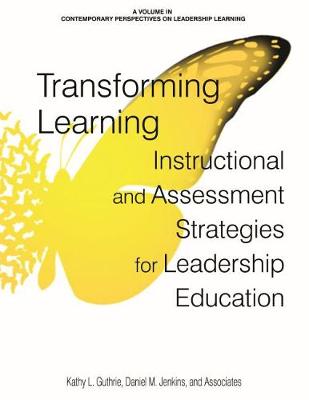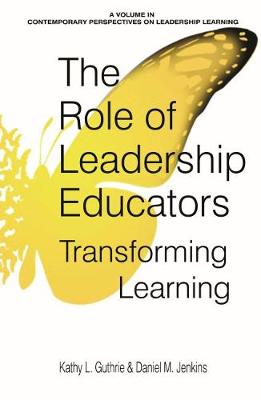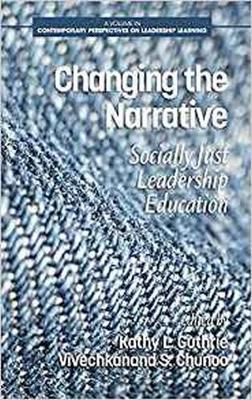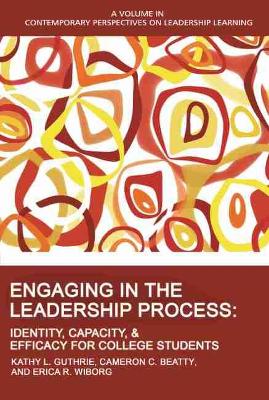Contemporary Perspectives on Leadership Learning
4 total works
In this companion manual to The Role of Leadership Educators: Transforming Learning, this text was developed to fill a significant resource gap in leadership education. In response to this gap, as well as leadership educators' call for professional development related to teaching and learning, this text is grounded in the college teaching and leadership education literature. Filled with 60 learning activities for diverse contributors, this book offers a hands-on resource for leadership educators to use when facilitating leadership learning opportunities.
Each learning activity includes learning outcomes, activity instructions, facilitation notes, and additional resources offered by the author. The text is organized by the pedagogical methods covered in The Role of Leadership Educators: Transforming Learning. Pedagogical methods covered include Discussion, Case Studies, Reflection, Team-Based Learning, Service Learning, Self- and Peer-Assessments, Role-Play, Simulation, Games, and Art. Each chapter contains six learning activities for each pedagogical method, four focused in instructional strategies (curricular, co-curricular, technology-enhanced, followership-focused) and two in learning assessment strategies (curricular and co-curricular).
Each learning activity includes learning outcomes, activity instructions, facilitation notes, and additional resources offered by the author. The text is organized by the pedagogical methods covered in The Role of Leadership Educators: Transforming Learning. Pedagogical methods covered include Discussion, Case Studies, Reflection, Team-Based Learning, Service Learning, Self- and Peer-Assessments, Role-Play, Simulation, Games, and Art. Each chapter contains six learning activities for each pedagogical method, four focused in instructional strategies (curricular, co-curricular, technology-enhanced, followership-focused) and two in learning assessment strategies (curricular and co-curricular).
The Role of Leadership Educators
by Kathy L. Guthrie and Daniel M. Jenkins
Published 31 January 2018
Leadership, as a discipline, leadership education, as a field, and leadership educator, as a profession are still in their infancy and rapidly evolving. As professionals in higher education, we are constantly asked to provide opportunities for students to learn leadership, whether that is inside or outside of the classroom. However, very little, if any professional development occurs in how to create such learning opportunities.
This book provides resources for leadership educators in three sections. The first section sets the stage for leadership education and the professional work of leadership educators, culminating with a variety of professional development resources for leadership educators. The second section introduces a leadership learning framework, provides characteristics and examples of strong leadership programs and assessment practices, and describes the transformative practice of leadership education. The third and final section offers specific instructional and assessment strategies ranging from discussion, case study, and reflection, to team-based- and service-learning to self-assessments, role-play, simulation, and games, to fulfill learning outcomes.
This book provides resources for leadership educators in three sections. The first section sets the stage for leadership education and the professional work of leadership educators, culminating with a variety of professional development resources for leadership educators. The second section introduces a leadership learning framework, provides characteristics and examples of strong leadership programs and assessment practices, and describes the transformative practice of leadership education. The third and final section offers specific instructional and assessment strategies ranging from discussion, case study, and reflection, to team-based- and service-learning to self-assessments, role-play, simulation, and games, to fulfill learning outcomes.
Social justice and leadership education are inextricably linked. In order to move social justice forward, we need to develop leaders with knowledge, skills, and values to engage effectively in the leadership process.
We need socially just leaders now more than ever. At a time when our elected and appointed officials agree on very little, our communities are divided and distrustful of one another, and individual citizens struggle for fairness in the face of discrimination, society is at a crossroad. In one direction lies the reproduction of oppression and marginalization, continued distrust, and further fragmentation. In the other, a route toward healing, compassion, and fairness. How then do we prepare our leaders of tomorrow to walk the path of justice rather than take the road to ruin?
Changing the dominant narratives in society involves preparing skilled social critics and knowledgeable advocates for positive and sustainable change through education. However, when leadership education fails to consider social justice issues, or when social justice education omits leadership learning, both fall short of their goals. This texts links issues of social justice, equity, and equality, to leadership knowledge, skills, and values, with the intent of offering theoretical, practical, and policy recommendations to improve the work of educators charged with preparing undergraduates for the complexities of leadership in all its forms. Collectively, the contributors inform much needed practices and pedagogies toward socially just leadership education.
No single one of us can change the narrative alone, but together, we can amplify the voices of those leading toward justice. The perspectives offered here are but a sample of the work being done to make the future a brighter place for all. We invite you to be part of the conversation.
We need socially just leaders now more than ever. At a time when our elected and appointed officials agree on very little, our communities are divided and distrustful of one another, and individual citizens struggle for fairness in the face of discrimination, society is at a crossroad. In one direction lies the reproduction of oppression and marginalization, continued distrust, and further fragmentation. In the other, a route toward healing, compassion, and fairness. How then do we prepare our leaders of tomorrow to walk the path of justice rather than take the road to ruin?
Changing the dominant narratives in society involves preparing skilled social critics and knowledgeable advocates for positive and sustainable change through education. However, when leadership education fails to consider social justice issues, or when social justice education omits leadership learning, both fall short of their goals. This texts links issues of social justice, equity, and equality, to leadership knowledge, skills, and values, with the intent of offering theoretical, practical, and policy recommendations to improve the work of educators charged with preparing undergraduates for the complexities of leadership in all its forms. Collectively, the contributors inform much needed practices and pedagogies toward socially just leadership education.
No single one of us can change the narrative alone, but together, we can amplify the voices of those leading toward justice. The perspectives offered here are but a sample of the work being done to make the future a brighter place for all. We invite you to be part of the conversation.
Engaging in the Leadership Process
by Kathy L. Guthrie, Cameron C. Beatty, and Erica R. Wiborg
Published 30 March 2021
This book introduces readers to process-based understandings of leadership, providing language and tools for engaging in the leadership process for all involved. This practical book was designed for college student leaders and educators or professionals who work with student leaders on college campuses. However, it is also accessible for high school students and graduate students to reflect on their identity, capacity, and efficacy as leaders. Based on their experiences as leadership educators, the authors offer grounding concepts of leadership and examples illustrating the complexity of culturally relevant leadership learning.
Identity (who you are), capacity (your ability), and efficacy (what you do) are important for students to explore leadership development. These three concepts are core to this book, filling a gap in college student development literature by defining, illustrating, and questioning how they matter to leadership learning.
Framing leadership as a journey, this resource offers key learning opportunities for students to engage with others through a range of contexts. Each chapter is organized with various features, engaging readers to get the most out of this book. Features include "call-in boxes" to prepare for learning and "pause for considerations" to apply to personal experiences. Chapters conclude with personal reflection questions, discussion questions, and activities to take leadership learning further. The features are designed to be accessible for utilization in classes, organizations, community work, groups, and individual reflection opportunities.
Identity (who you are), capacity (your ability), and efficacy (what you do) are important for students to explore leadership development. These three concepts are core to this book, filling a gap in college student development literature by defining, illustrating, and questioning how they matter to leadership learning.
Framing leadership as a journey, this resource offers key learning opportunities for students to engage with others through a range of contexts. Each chapter is organized with various features, engaging readers to get the most out of this book. Features include "call-in boxes" to prepare for learning and "pause for considerations" to apply to personal experiences. Chapters conclude with personal reflection questions, discussion questions, and activities to take leadership learning further. The features are designed to be accessible for utilization in classes, organizations, community work, groups, and individual reflection opportunities.



